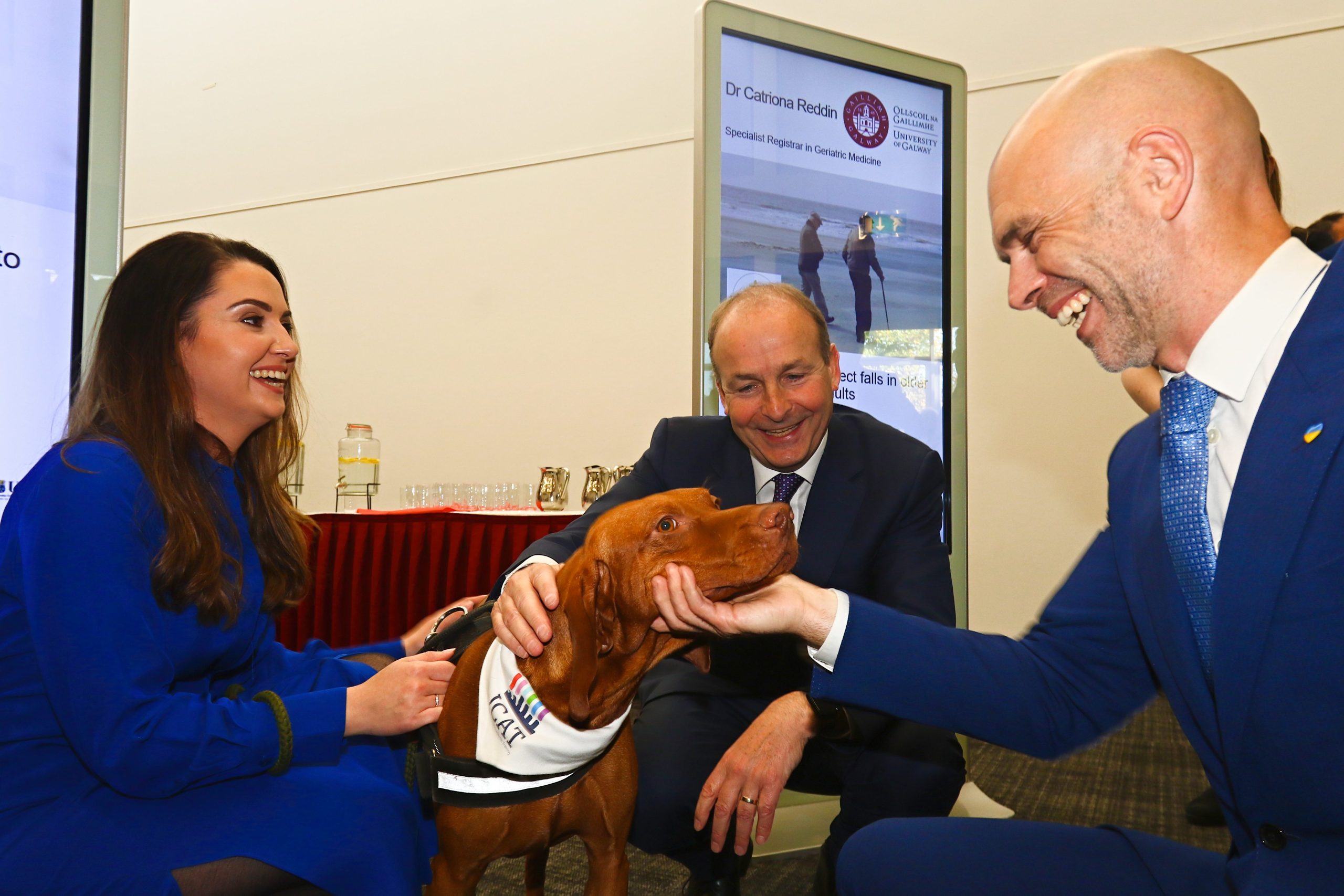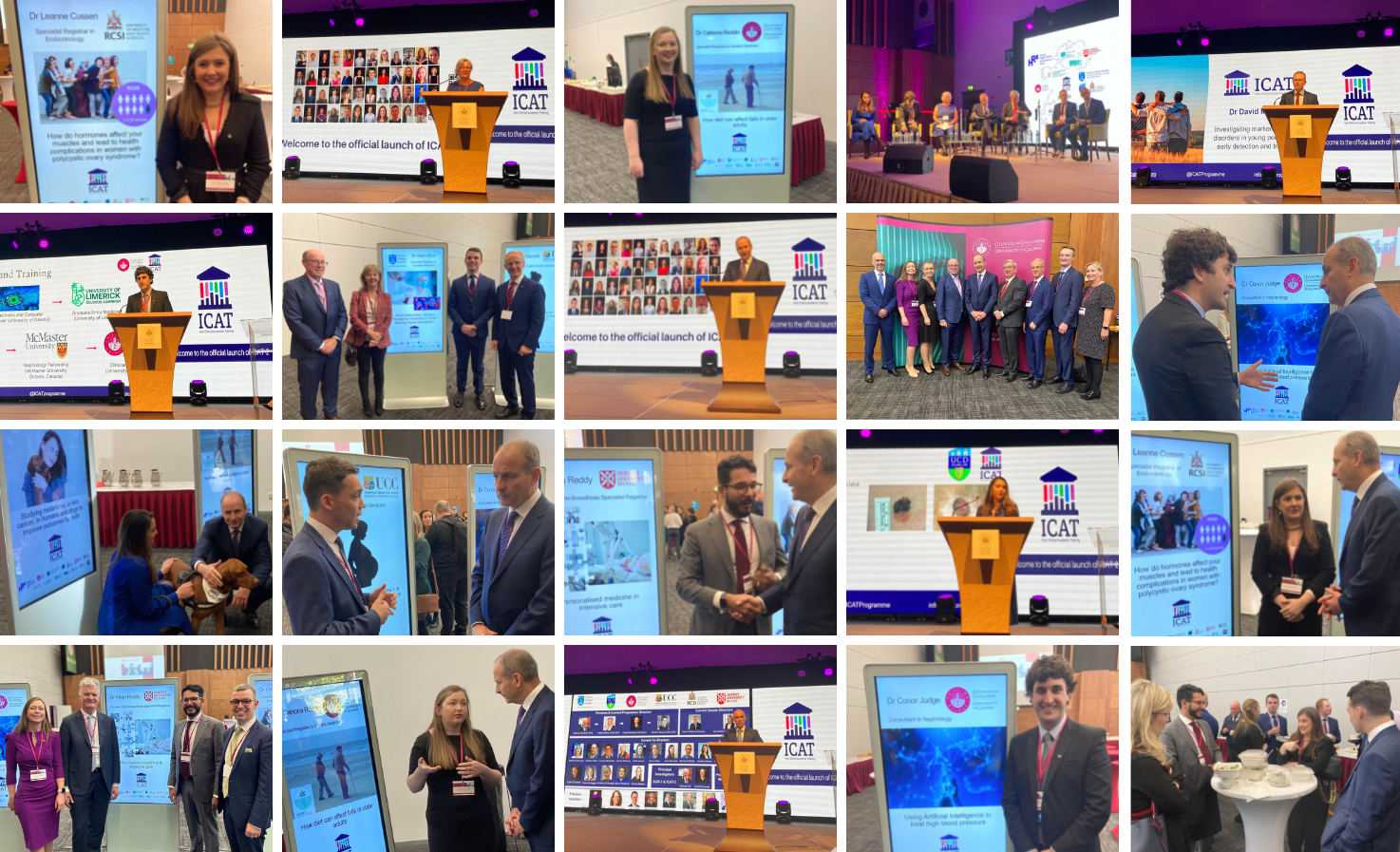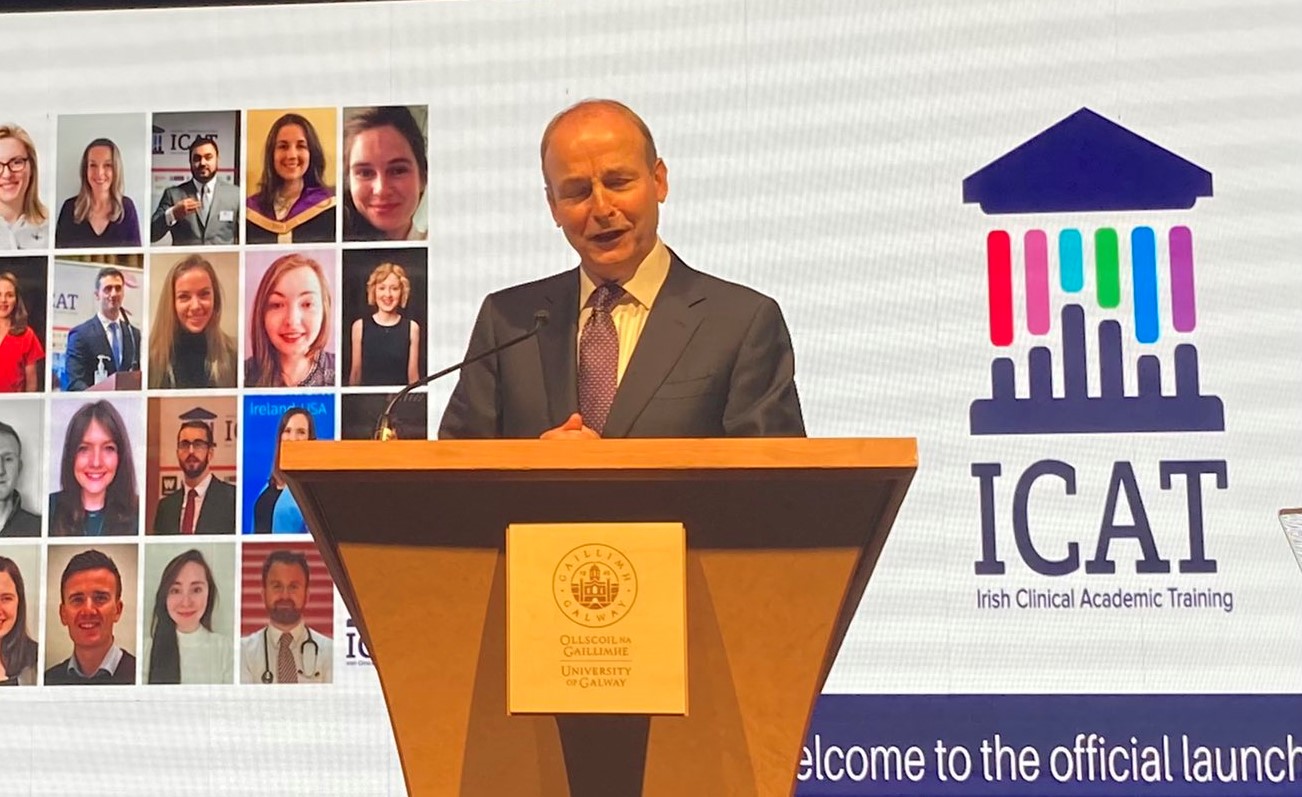
Taoiseach Micheál Martin T.D. today launched the second phase of the cross border Irish Clinical Academic Training (ICAT) programme with an investment of €21.3 million to train 42 fellows in medicine, dentistry and veterinary medicine.
A total of 81 fellows will be supported over both cycles of the programme.
The ICAT programme has been awarded to six equal stakeholder partner universities by the Health Research Board (HRB) – University of Galway, Queen’s University Belfast, Trinity College Dublin, University College Cork, University College Dublin, RCSI University of Medicine and Health Sciences. ICAT is designed to support some of brightest minds in health and social care on the island of Ireland to enhance research-informed healthcare to improve human and animal health.
This all-island initiative was unveiled as part of a two-day programme at University of Galway, marking the inaugural Healthcare Forum at the University’s College of Medicine, Nursing and Health Sciences, exploring the future of health education, research and industry collaborations.
This is the second phase of ICAT. The programme is hosted by University of Galway and involves a funding package of €21.3 million, which includes €11m from the HRB, as well as €10 million from the partner universities, the HSE National Doctors Training and Planning, the Health and Social Care Research and Development Division (NI), College of Anaesthesiologists of Ireland, Department of Agriculture, Food and the Marine, and Northern Ireland Medical and Dental Training Agency (NI).
Phase 1 of ICAT began in 2016 and was hosted by Trinity College Dublin with an overall €17 million funding package.
Taoiseach Micheál Martin said: “Our Government is deeply committed to research and innovation and its role in the future of healthcare. Investment of this scale and with this strategic outlook will help to position Ireland as a place where top-class researchers and innovators are afforded the opportunity to strive for lasting, impactful change which tackle challenges of our time.
“The ICAT Programme has proven to be a catalyst for some of the brightest minds in healthcare and I am delighted to see the ambition in phase 2 of the programme.”
Principal Investigator of the ICAT Programme, Professor Conall Dennedy, Associate Professor of Therapeutics at University of Galway, said: “This second phase of the Irish Clinical Academic Training programme is an opportunity for 42 fellows across medicine, dentistry and veterinary medicine to become world class researchers in parallel with their clinical training, within a networked and collaborative environment.
“It is the vision of the programme to enhance the health of people in Ireland and Northern Ireland, as well as animal welfare, embracing the principles of One Health. This large investment by the HRB, six partner universities and associates is critical to futureproofing the health of our nations.”
Dr Mairéad O Driscoll, chief executive of the Health Research Board, said: “The HRB is committed to supporting a thriving research ecosystem that improves health and social care services in Ireland and makes a real difference to people’s lives.
“The ICAT programme exemplifies this, and we are delighted to extend its first round of funding into an expanded phase two that now includes dentists and veterinarians alongside doctors and medics.
“This multidisciplinary, collaborative, all-Ireland programme will attract, train and retain a new generation of world-class clinical health researchers that will drive the integration of research and evidence into policy and practice, and improve decision-making and health outcomes.”
ICAT supports participant fellows to undertake truly novel research by availing of a large networked pool of experienced supervisors, facilitating an easy mobility of ICAT fellows between Northern Ireland and Ireland. The success of this approach is evident from past and current ICAT fellows.
Dr David Mongan is an ICAT graduate from RCSI University of Medicine and Health Sciences and Specialist Registrar in Psychiatry. He is interested in finding new interventions which can prevent psychosis and other mental health conditions.
Dr Mongan said: “When I joined the ICAT programme I spent my first year in Queen’s University Belfast developing my PhD project, before moving to RCSI in Dublin for a 3-year PhD. My PhD focused on the discovery of markers that can help to predict who is at risk of developing a psychotic condition. ICAT afforded me the opportunity and mobility to define my research interests and to develop a network of experienced researchers across the island of Ireland, each of whom played a major role in my fellowship training and mentorship. I have now completed my fellowship and will complete my clinical training and continue my research as an Academic Clinical Lecturer in Queen’s University Belfast.”
Dr Claire Potter is a Specialty Trainee in General Adult and Old Age Psychiatry. She has integrated her research across NI and Ireland using two large research databases which focus on the ageing population, namely the TILDA and NICOLA databases. During her PhD at the Centre of Public Health in Queen’s University Belfast, Dr Potter studies how stressful experiences during childhood can potentially make individuals ‘age’ more quickly.
As part of her PhD, Claire is looking at whether children who had more stressful experiences growing up during the Troubles in Northern Ireland perform worse in memory tests when they are older. Dr Potter has also been awarded a Fulbright award during her ICAT fellowship and will continue her research in the University of Michigan looking at a different population database.
Dr Stephanie Bollard is an ICAT Fellow in University College Dublin and Specialist Registrar in Plastic, Reconstructive and Aesthetic Surgery. She exhibited her research at the ICAT Phase 2 launch at University of Galway.
Dr Bollard said: “I have a special interest in melanoma, which is a very aggressive form of skin cancer. It is very hard to predict how the cancer will progress in each patient. My PhD is focused on improving outcomes for patients with melanoma by personalising their management. Melanoma is also common in dogs and my study uniquely takes the approach of improving the health of both dogs and humans with melanoma by combining my skills in human medicine with the skills of veterinarians and basic scientists.”

The press release can be read on the University of Galway website here.
